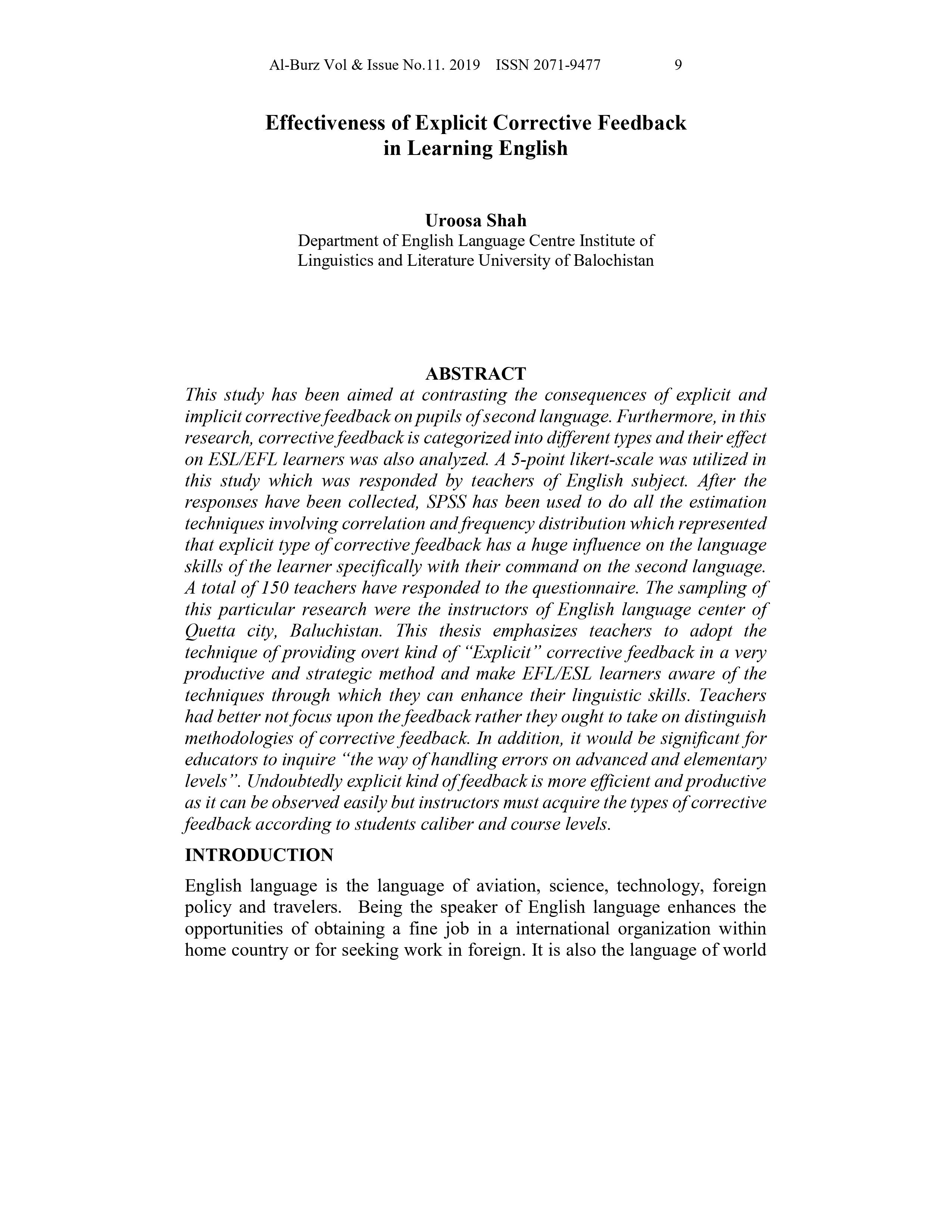Effectiveness of Explicit Corrective Feedback in Learning English
DOI:
https://doi.org/10.54781/abz.v11i1.55Abstract
This study has been aimed at contrasting the consequences of explicit and implicit corrective feedback on pupils of second language. Furthermore, in this research, corrective feedback is categorized into different types and their effect on ESL/EFL learners was also analyzed. A 5-point likert-scale was utilized in this study which was responded by teachers of English subject. After the responses have been collected, SPSS has been used to do all the estimation techniques involving correlation and frequency distribution which represented that explicit type of corrective feedback has a huge influence on the language skills of the learner specifically with their command on the second language. A total of 150 teachers have responded to the questionnaire. The sampling of this particular research were the instructors of English language center of Quetta city, Baluchistan. This thesis emphasizes teachers to adopt the technique of providing overt kind of “Explicit” corrective feedback in a very productive and strategic method and make EFL/ESL learners aware of the techniques through which they can enhance their linguistic skills. Teachers had better not focus upon the feedback rather they ought to take on distinguish methodologies of corrective feedback. In addition, it would be significant for educators to inquire “the way of handling errors on advanced and elementary levels”. Undoubtedly explicit kind of feedback is more efficient and productive as it can be observed easily but instructors must acquire the types of corrective feedback according to students caliber and course levels.
References
Abaya, R (2014). Corrective Feedback in English Language Teaching and Learning: Which Way to Go? 2(10). 5-12.
Bitchener, J., & Knoch, U. (2009). The relative effectiveness of different types of direct written corrective feedback. System, 37(2), 322-329.
Chapelle, C. A. (2009). The relationship between second language acquisition theory and computer‐assisted language learning. The modern language journal, 93, 741-753.
Dlaska, A., & Krekeler, C. (2013). The short-term effects of individual corrective feedback on L2 pronunciation. System, 41(1), 25-37.
Ellis, R. (2009). Corrective feedback and teacher development. L2 Journal, 1(1).
Falhasiri, M., Tavakoli, M., Hasiri, F., & Mohammadzadeh, A. R. (2011). The Effectiveness of Explicit and Implicit Corrective Feedback on Interlingual and Intralingual Errors: A Case of Error Analysis of Students' Compositions. English Language Teaching, 4(3), 251-264.
Gordon, J., Darcy, I., & Ewert, D. (2012, August). Pronunciation teaching and learning: Effects of explicit phonetic instruction in the L2 classroom. In Proceedings of the 4th pronunciation in second language learning and teaching conference (pp. 194-206).
Hall, T. (2002). Explicit instruction. Retrieved March, 2, 2011.
Hyland, K., & Hyland, F. (Eds.). (2019). Feedback in second language writing: Contexts and issues. Cambridge university press.
Hartshorn, K. J., Evans, N. W., Merrill, P. F., Sudweeks, R. R., STRONG‐KRAUSE, D. I. A. N. E., & Anderson, N. J. (2010). Effects of dynamic corrective feedback on ESL writing accuracy. Tesol Quarterly, 44(1), 84-109.
Lightbown, P. M., & Spada, N. (1990). Focus-on-form and corrective feedback in communicative language teaching: Effects on second language learning. Studies in second language acquisition, 12(4), 429-448.
Lin, H. J. (2009). Bilingualism, feedback, cognitive capacity, and learning strategies in L3 development (Doctoral dissertation, Georgetown University).
Loewen, S., & Erlam, R. (2006). Corrective feedback in the chatroom: An experimental study. Computer Assisted Language Learning, 19(1), 1-14.
Mackey, A., & Sachs, R. (2012). Older learners in SLA research: A first look at working memory, feedback, and L2 development. Language Learning, 62(3), 704-740.
Saito, K., & Lyster, R. (2012). Effects of form‐focused instruction and corrective feedback on L2 pronunciation development of/ɹ/by Japanese learners of English. Language Learning, 62(2), 595-633.
Shintani, N., & Ellis, R. (2013). The comparative effect of direct written corrective feedback and metalinguistic explanation on learners’ explicit and implicit knowledge of the English indefinite article. Journal of Second Language Writing, 22(3), 286-306.
Zhang, L. J., & Rahimi, M. (2014). EFL learners' anxiety level and their beliefs about corrective feedback in oral communication classes. System, 42, 429-439.

Downloads
Published
How to Cite
Issue
Section
License
Copyright (c) 2019 Authors who publish with Al-Burz journal agree to the following terms: 1. Authors retain copyright and grant the journal right of first publication with the work simultaneously licensed under a Creative Commons Attribution (CC-BY) License that allows others to share the work with an acknowledgement of the work's authorship and initial publication in this journal. 2. Authors are able to enter into separate, additional contractual arrangements for the nonexclusive distribution of the journal's published version of the work (e.g., post it to an institutional repository or publish it in a book), with an acknowledgement of its initial publication in this journal.Alburz has licensed under a CC Attribution-NonCommercial-ShareAlike 4.0



